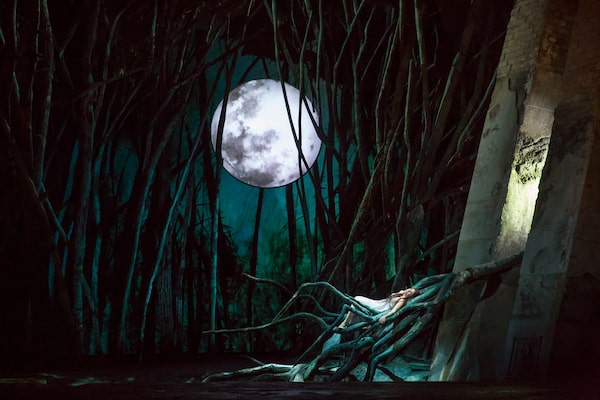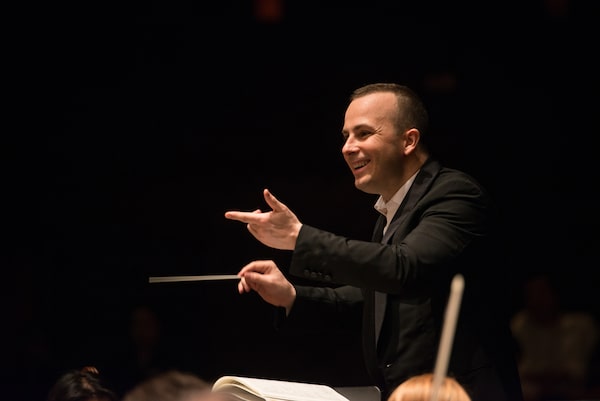
Antonin Dvorak’s Rusalka is a fairy tale named for the water nymph who falls in love with a human prince.© Todd Rosenberg Photography
Rusalka, Canadian Opera Company, Oct. 12-26
Antonin Dvorak’s Rusalka, it turns out, has something for all types of opera fans. The story, sung in the composer’s native Czech, is a fairy tale named for the water nymph who falls in love with a human prince. It’s not a direct adaptation, but Rusalka shares some key plot points with The Little Mermaid – enough to appeal to first-time operagoers who don’t feel like being intimidated by a complicated libretto.
Dvorak wrote Rusalka right in the middle of the same lush Romantic era of Puccini and Rachmaninoff, and his music sounds like it. The composer has a knack for pairing stunning orchestration with heart-tugging, folk-like melodies (such as this opera’s famous tune, Song to the Moon). If you’re a selective operagoer looking for downright gorgeous music, Rusalka is a sure thing.
And those opera fans who consider themselves a bit more hardcore will find plenty to devour in the production going up at the Canadian Opera Company this fall. There’s the A-list direction by David McVicar, and the fantastical, looming design by John Macfarlane; but mostly, it’s in hearing Sondra Radvanovsky sing the title role. Radvanovsky, a Callas-like star of today, has made her name famous with Italian opera roles – Norma, Tosca, Aida and of course, Donizetti’s three queens – and this Rusalka is a rare chance to hear her sing in another language, which, in terms of opera, is akin to an entirely other style.
Il trittico, Pacific Opera Victoria, Oct. 17-27
Puccini’s Il trittico, produced this fall by Pacific Opera Victoria, is a bit of a gem of the operatic repertoire. The triple-bill is not often done in its entirety, but individually, the three short operas – Il tabarro; the more well-known Suor Angelica; and Puccini’s only comedy, Gianni Schicchi – are firmly in the canon.
To catch Il trittico as a whole is to get a special glimpse into the singers’ craft. In any good production, there is a healthy overlap in the casting of the three operas – a brilliant tool for drama, where the audience can see one singer’s arc from supporting character to villain to comic genius, all in one evening.
It’s a brilliant way for Pacific Opera Victoria to showcase the Canadian talent in this cast, particularly Calgary-born soprano Aviva Fortunata; she’ll sing back-to-back dramatic leads in Il tabarro and Suor Angelica, then join the comedy ensemble of Gianni Schicchi. New Brunswick native Owen McCausland will be a heartfelt Rinuccio in Schicchi, and opera fans should pay attention to mezzo-soprano Megan Latham as the Princess in Suor Angelica.
Fidelio, Opéra de Montréal, Oct. 25-27

The reason to catch this particular Fidelio in Montreal is to see Yannick Nézet-Séguin conduct it in his hometown.Jan Regan
Beethoven’s Fidelio is the only opera he wrote and, to be entirely honest, there are moments in the score when you can hear the composer’s lack of operatic experience. Fidelio is famously difficult to sing, no matter the role, and the piece doesn’t charm in the same way as the graceful ease of Puccini or Strauss. But the story of Fidelio, which is a bit Orpheus-and-Eurydice, but with political prisoners and cross-dressing, really does have things to say about love, even feminism.
The reason to catch this particular Fidelio in Montreal is to see Yannick Nézet-Séguin conduct it in his hometown. Nézet-Séguin, the ball of energy who is currently music director of the Metropolitan Opera, seems to draw the orchestra’s presence from the pit to the stage, making the music a true part of the show. It’s exactly what you want out of a Fidelio, where Beethoven’s score is as dense as dramatic.
That, and a maestro with enough spine to hold his own next to the likes of Michael Schade as he hollers out the tough-as-nails role of Florestan.
Susannah, Manitoba Opera, Nov. 23-29
Carlisle Floyd’s 1955 opera Susannah is a rarity in Canada, partly because it’s a tough sing, but perhaps largely because it’s so quintessentially American. The opera, adapted from the biblical story of Susanna and the Elders, is set in McCarthy-era Appalachia and named for the young woman who does her best to stand up against small-town life in Tennessee – and one predatory man of God. The music is about mountainous landscapes and small towns; the characters sing the word “ain’t” with unashamed beauty.
Manitoba Opera’s production of Susannah, directed by Canadian staple Kelly Robinson, is a refreshing pick for the mid-sized company, and a great way to show off Canadian soprano Lara Ciekiewicz in the title role. It may look and sound wholly American, but Floyd’s opera tells a story that nearly all women know: There is a huge cost for a woman to make a social misstep or to resist the attention of a powerful man.
Figaro’s Wedding, Against the Grain Theatre, Dec. 3-20
Against the Grain Theatre is celebrating its 10th season with a proud look back at its decade of work, reviving past productions (with new twists, to be sure) and presenting to new and returning audiences some of the company’s most significant and award-winning projects. The company set a serious opera trend in 2013 with Figaro’s Wedding, the first of artistic director Joel Ivany’s “transladaptations” of three operas by Mozart and Da Ponte: Le nozze di Figaro; Don Giovanni (#UncleJohn); and Cosi fan tutte (A Little Too Cozy).
Figaro’s Wedding, though only five years old, already has some history of its own; followers of AtG might find this December revival – running at one of Toronto’s top hipster wedding venues, the Enoch Turner Schoolhouse – a barometer of sorts for where Canada’s indie opera darlings have come from, and where they are now.
If that’s not enough, go see Figaro’s Wedding for Miriam Khalil’s Countess and Greg Finney’s character skills as Bartolo and Antonio.